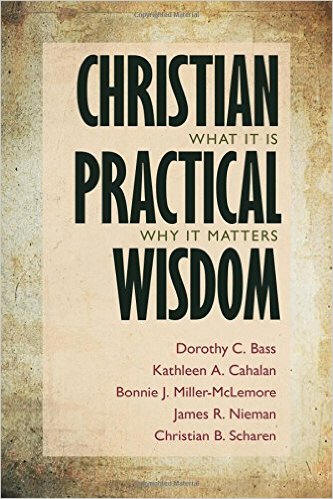Book Review
Christian Practical Wisdom:
What it is, Why it matters
Dorothy C. Bass, Kathleen A. Cahalan et al
William B Eerdmans
Publishing Company
ISBN: 978-0802868732
 The
five authors of this highly readable account of Christian practical wisdom
remind us that theology at its best is a lived experience and is acquired
by the practice of our faith. It cannot be seen as something abstract and
apart from our daily living.
The
five authors of this highly readable account of Christian practical wisdom
remind us that theology at its best is a lived experience and is acquired
by the practice of our faith. It cannot be seen as something abstract and
apart from our daily living.
The first part is on the nature of Christian practical wisdom. Our ordinary experiences act as sources of practical wisdom. This in turn opens us to experience God. The second part reminds us of the way in which practical wisdom has been dulled in our secular age and how it can be retrieved. Practical wisdom, say the authors, is both situational and universal. Surely, a discussion of the natural law tradition would have been a good fit in this section? Aquinas, MacIntyre and others from a broadly Thomist tradition are mentioned in passing. Understandably, given the discussion about confrontation with the secular age, Charles Taylor gets more than a few pages to himself.
Bernard Haring, so recently praised by Pope Francis, is given a mention. Certainly, his book The Law of Christ managed to integrate the moral life within overall Christian living in a way that some other prior works were unable to achieve. It was, after all, praised by the great Dietrich Von Hildebrand. Unfortunately, Haring was later to move into a position of theological dissent.
There is an excellent section on the "victory of Cartesian rationalism" and its impact on theology. The Dominican theologian Fergus Kerr is quoted as claiming that Hans Kung pictures the individual in a deeply Cartesian way as someone who must learn to trust that God exists in the same way he trusts that the world exists. The sections of the book on the letters between Descartes and Princess Elizabeth are among the most interesting: the philosopher had to concede that there were serious limitations to his method.
The authors note that "practical wisdom requires richness of experience for the sake of being able to perceive and weigh the significance of particular cases." Thus phronesis is essentially about perception, judgement and action. It could be argued that without being embedded in the natural law tradition, there is always the danger of relativism. However, as the authors note, the book is not so much about the nature of phronesis as it is about how phronesis acts in Christian practice. And so, unsurprisingly, the last sections of the book examine how we should live our spiritual lives: John Cassian, Gregory of Nyssa and The Cloud of Unknowing are all discussed in very helpful ways. The section discussing humility, the teacher of all virtues, is splendid.
All serious theology should be practical. In this work, the authors argue this with utter conviction.
Reviewed by Dr Pravin Thevathasan
